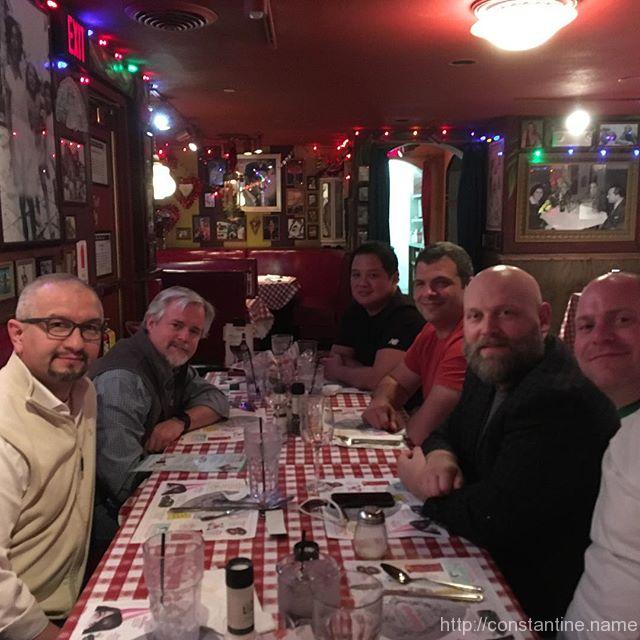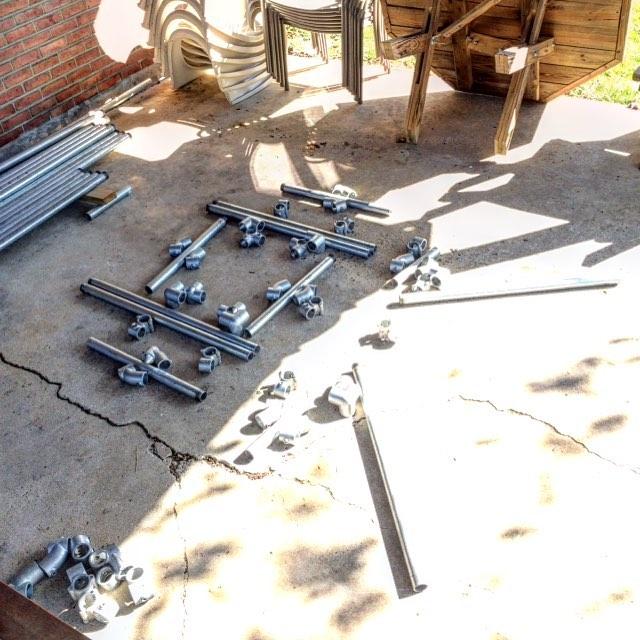Sorry — too little time left.
~ Richard Avedon, from Creative People Say No
slip:4umeke1.
Well, there’s someone who has it figured out.
ɕ
Sorry — too little time left.
~ Richard Avedon, from Creative People Say No
slip:4umeke1.
Well, there’s someone who has it figured out.
ɕ
Reading time: About 4 minutes, 900 words
Get 7 for Sunday in your inbox. → Subscribe here.
This issue is https://7forsunday.com/80

Suppose you wanted to be surprised and delighted (and possibly intrigued and befuddled) in some field. You could start with the Top 10. Today, I’m talking about movies, so find some list of the 10 Greatest Films. This sort of listing is ubiquitous: 10 Greatest Dramas, 100 Films preserved by the U.S. Library of Congress, The British Film Institute’s (BFI) 100 Greatest Films, and on and on.
The following list from BFI is not that sort of list. Not at all.
Each of these films is one of the greatest according to just one voter in our recent Greatest Films of All Time poll; they are some of the hidden gems among the more than 4,300 films voted for by more than 2,000 participants. (For the pedantic reader, the films that got one vote each – more than we can fit in here – are all technically joint 1,956th greatest film of all time, combining the tallies of our critics’ and directors’ polls.)
~ from 101 hidden gems: the greatest films you’ve never seen
slip:4uousi2.
Effectively, that’s a list of 101 movies which all tied for last place, in list of the top 2,000-or-so movies. Above, the BFI is showing an entirely different way to be surprised and delighted (and possibly intrigued and befuddled): Find one person who is into the thing way more than you, and ask them for a list of the greatest. On their list, it is likely there will be one which they recommend, that no one else would recommend. What is up with that one recommendation?
Any big list is created by many people collaborating and, in the end, averaging out their individual tastes. But if you ask that one really-into-it person, you’ll get a very surprising and delightful (and probably intriguing and befuddling) opinion.
ɕ
What makes the difference between an outstandingly creative person and a less creative one is not any special power, but greater knowledge (in the form of practiced expertise) and the motivation to acquire and use it. This motivation endures for long periods, perhaps shaping and inspiring a whole lifetime.
~ Margaret A. Boden
slip:4a1140.
As it happens, my journalism often requires I read a mountain of material. For any given Wired column, for example, I might read dozens of white papers, reports, and news articles. I’ll also do ten or twelve interviews and transcribe them. When I’m researching a longer feature for a magazine? This number quickly grows to scores of documents, and several dozen interviews. And with a book — like my last one, Coders — we’re talking about literally hundreds and hundreds of documents (books, papers, etc) and several hundred transcribed interviews.
~ Clive Thompson from, How I Take Notes When I’m Doing Research
slip:4umeho1.
I love when people take the time to explain some of the effort which goes into writing, then writing well, writing articles well, and writing books well. I’m still on level, “writing” and knowing what goes into writing well (let alone writing articles or books well) keeps me from developing any delusions of grandeur. I read Thompson’s article (which I hope you can read on Medium if you wish to click through) and I loved it. That’s enough to make the reading worth doing. Being able to quote, share, reflect and sometimes integrate what I’ve read? Priceless.
Also: Thank you for reading. I don’t take your attention for granted. :^)
ɕ
The world expects that its requests will be accepted. That assignments, lunch dates, new projects, and even favors will get a yes. […] It’s just a small ask, the person thinks. Responding or reacting to incoming asks becomes the narration of your days, instead of the generous work of making your own contribution.
~ Seth Godin
slip:4a841.
This community’s value proposition is about more than being the Hacker News or reddit for travel. The focus is squarely on quality.
~ Anuj Adhiya from, «https://cmxhub.com/outbounding-hook-model/»
Yes, please. Based on that statement alone, I’d want to be a part of this sort of community.
The basic idea is that, to create habit-forming communities, you must move a user through a loop that over time will help them develop a habit of returning and contributing to the community. It looks like this: A trigger, internal or external, drives a user to the platform where they get some sort of variable reward, contribute something of their own, and return to the platform later for the same loop.
~ ibid.
Uhmmm… (That slight-squint with slightly-sideways, dubious look happens here.) Habituation is not, per se, a good thing. I agree that it is important to understand how what’s said there actually works; I often talk about the Oxo® handles we all have sticking out of our psyches. The ability to generate a habit in someone else is clearly one such handle.
A community comes into extence from the network of interpersonal relationships. A community isn’t, simply by its existence, a good thing. Also, if those relationships form because of habituation to come to the community space, that still doesn’t mean the community is a good thing. And we don’t even need habituation in order to form those interpersonal relationships. Yes, we may be able to “hack” those relationships into existence via habituation, but there are other ways to encourage those relationships.
I want to be part of communities that understand the nature of the interpersonal relationships, and the effect a community has as a whole. I want to be part of communities where those things are actually positive goods.
ɕ
white-with-orange, orange
white-with-green, BLUE!
white-with-blue, GREEN!
white-with-brown, brown
I have probably said that sequence—sure, aloud many times, but mostly muttering under my breath, always moving my lips—about 9 gazillion times. If you know what that is, I weep for you; and we have a support group which meets at the bar and the first round is on me.
I’m reading—literally just this moment… I have my arms stretched around the book as I type—On Writing by Stephen King. (Highly recommended by the way. In parts deeply useful, deeply touching, deeply funny, just all-around deeply.)
John Grisham, of course, knows lawyers. What you know makes you unique in some other way. Be brave. Map the enemy’s positions, come back, tell us all you know. And remember that plumbers in space is not such a bad setup for a story.
~ Stephen King from, On Writing
POW! my brain muttered “white-with-orange…” And I was yanked, much in the way I’ve yanked L I T E R A L L Y miles of wire through ceilings… hell, I know what a plenum is and why you can pull that cable through it and not this other cable. POW! “white-with-orange, orange, …” Yanked back to good old, kill-me-now I’d forgotten this and hoped I’d never remember it: T568B.
B. BEE! mind you. omgbecky don’t go all white-with-green on me to start the sequence ‘cuz that’s T568A and if you we do B on this end, but A on the punch-down blocks back in the squirrel closet we won’t even get link lights let alone have the tester [magic box of circuitry] be happy.
Never mind when they started using Category-5 cabling and I stripped off the jacket… Actually, with Cat-5—or was that 5+? or Cat-6… I need a drink—where the jacket is sort of partly heat-shrunk on so you need a special tool just to get the jacket cut before you can pull it off. And then you discover not only are the pairs of wires twisted—bro’ that’s so Cat-3, right? No, now in Cat-5 the pairs are twisted at different rates—the number of twists-per-inch is different on each of the four pairs to reduce the magnetic inductance coupling—no, I’m not making this stuff up; pay attention, kid. Oh, and they’re not only twisted, but the pair is actually in a stuck together jacket—so you need this other little tool that you shove onto the end of the pair and it has a teeny razor blade in it that cuts the wires apart like—sorry for this metaphor—like a razor cutting the skin between your fingers, as you push and spin the tool to separate the wires.
Then you can wrestle the pairs, in the right order (see above!) into the shape, like a whale tail. Eight tiny wires that you VICE-finger-pinch flat, then cut ’em all off in one go. Wizards could shoot those eight tiny wire snips into a little trash catch we had with us so we didn’t leave ’em in the ‘ol office carpet. Then—hey, don’t slip!—slide the plug on the end, and stuff it in this special tool… When you grabbed it, you had to exactly judge where to grab cuz if you’re too far from the end it’s not good, too close to the end and you can’t get the plug on fully, and you can’t move your fingers at all because it takes full-strength to pin 8 tiny wires perfectly in the right place after you cut them off in one go.
Or if you’re making up a wall-jack or a punch-down panel you can just sort of lay the wires in the v-grooves—but don’t untwist them too far, each one is a tiny radio antenna—and “punch” them down with a tool that trimmed the ends—which always managed to ping, pong, bing, bong right into anything that you couldn’t get into to retrieve them. Ever wonder why vents on computers, and everything are on the sides?
One. That’s one. This office has 150 more wall jacks, and the other ends of course, and all the wires have to be labeled cuz the rat nest has to make sense…. and then you have to test it and if one single wire isn’t perfect.
So yeah, that was fun. Holy shit! Where’s the Tylenol?!
ɕ
I’ve written before about the sounds of summer thunderstorms. I’m completely trained to relax and drift away to these sounds.
It’s said there are three things you can stare at endlessly: running water, fire, and other people working. I believe the first two trigger something deep within our brains; I believe there’s something about the small, random movements of water and fire which hypnotize the predator part of our brains… something about those movements stimulates our visual cortex.
But sound! The auditory part of our brain is older still, and the sound of running water is—at least for me, how about you?—deeply alluring. I’ll sit under cover on my patio and freeze my ass off just to hear the rain falling and the sound of water in the gutters.
Anywho. What brings up this train of thought? …on a gloriously sunny and blue-skied day?
…”sounds of rain and thunder,” is a thing you can listen to on Pandora.
ɕ
No matter where your adventure takes you, most of what is truly meaningful is still to be found revolving around the mundane stuff you did before you embarked on your adventure. The stuff that’ll be still be going on long after you and I are both dead, long after our contribution to the world is forgotten.But often, one needs to have that big adventure before truly appreciating this. Going full circle. Exactly.
~ Hugh MacLeod
slip:4a937.
I like this idea because it means that today, things are as bad as it can get.
I’m already super-busy, super-stressed, super-anxious, super-self-critical and super-distracted. I’m pretty sure that finishing another project—just. one. more!—is not going to magically fulfill me. Somehow this lesson is easy to understand but hard to know… hard to integrate.
But “scale”? That’s something I really understand. I understand what happens with something that can scale, and something that cannot scale. So if humans—i.e., me—don’t scale, why do I keep trying to make me scale?
ɕ
slip:4uleai1.
~ Lee Sandlin
“Where’s the pull-quote?” I don’t know how to choose one.
“What’s the take-away?” I don’t know how this could be made more succinct.
“Why should I read it?” I have no idea how to place the thing which is “The Second World War” into context. (…nor into the context of my life, and certainly not into the context of your life.)
Obviously, I don’t remember the second world war.
Obviously, I don’t understand the second world war.
But I do know that this shook me to my core. This brought a tear to my eye. I read it twice — the first time in one sitting; straight through. Somehow, it seems to grab at all the frayed, loose ends of all the things I know about the War and– well, just grabbed them all into one place.
ɕ

Having dinner with some of the Aikido guys before a seminar tomorrow. Multiple black belt tests tomorrow.
ɕ

Regular tables don’t survive. This has been just a pile of Kee clamps on my work bench for about a year. Oof! Burly table.
ɕ
We love these flawed superheroes, because it makes them relatable, vulnerable, and REAL. It gives them an identity; as readers of comics or viewers of a movie, we get to look inside these people and know that they feel real pain too, and we see parts of ourselves in them. … Why, then, don’t we do this with our real-life heroes and ourselves?
slip:4unebo10.
ɕ

Sun is shining, birds are chirping, and there’s something new coming in scaf-land…
ɕ

ɕ
The bulk of the advice can be summed up with “don’t be a dick.” Don’t be late, don’t be rude, don’t place your immediate convenience over the feelings and efforts of the person you’re interacting with.
~ Peter Welch from, Etiquette Lost
slip:4usiei1.
ɕ
Here’s an interesting form of murder we’ve come up with: assassination. You know what’s interesting about assassination? Well, not only does it change those popularity polls in a big fucking hurry, but it’s also interesting to notice who it is we assassinate. D’you ever notice who it is; stop to think who it is we kill? It’s always people who’ve told us to to live together in harmony and try to love one another. Jesus, Gandhi, Lincoln, John Kennedy, Bobby Kennedy, Martin Luther King, Medgar Evers, Malcolm X, John Lennon. They all said “Try to live together peacefully.” BAM! Right in the fuckin’ head. Apparently, we’re not ready for that.
~ George Carlin from, George Carlin
ɕ